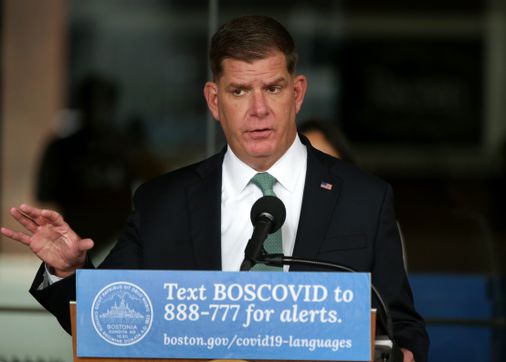City Councilor Andrea Campbell formally announced her candidacy for mayor Thursday, joining fellow councilor Michelle Wu in what history suggests is an uphill battle to replace a popular incumbent.
By the way, Marty Walsh intends to run for a third term.
He wouldn’t confirm that when I spoke to him Thursday, but I’ve talked to people close to him, and they say he’s in.
Those confidantes say Walsh will wait until after the presidential election to announce. The timing has nothing to do with the speculation that if Walsh’s longtime friend Joe Biden wins the White House, Biden would offer Walsh some position in his administration.
Advertisement
Given his and his family’s long association with organized labor, Walsh would make a fine labor secretary. Given that his parents grew up in Ireland and his enduring affinity for the land of his forebears, he’d be a natural as ambassador there.
But that presumes a Biden victory, and all the speculation ignores the reality that Walsh is the main caregiver for his elderly mother, Mary, who still lives in the Dorchester three-decker where he grew up. The idea of leaving his mom behind or uprooting her — not to mention his partner, Lorrie Higgins — for some new job in Washington doesn’t make a lot of practical sense.
At this point, he will face at least a couple of formidable women. Given that they are women of color, this could be the city’s deepest dive to date into what the political wise guys call identity politics.
But then, all politics are identity politics. Candidates’ identities — the ones they want to project, the ones voters perceive — are at the heart of electoral politics and always have been.
Identity politics has become something of a perjorative, because if taken to extremes, it can reduce candidates to one- or two-dimensional figures.
Advertisement
So if you accept one definition of identity politics, voters should be expected to vote for or against Michelle Wu because she is an Asian-American woman, or Campbell because she is a Black woman, or Walsh because he’s a white male.
But if you take the literal definition of identity politics — a tendency for people of a particular religion, race, or social background to form political alliances, moving away from traditional broad-based party politics — that doesn’t sound like an effective way to win an election in a city like Boston.
If Bostonians were given to the standard definition of identity politics, it would be hard, given the shift in demographics here, to explain how Marty Walsh was elected once, much less twice.
Walsh will be tough to beat, not just because of the power of incumbency, which is arguably greater in the midst of a pandemic that most voters say Walsh has handled well, and not just because of his substantial war chest, now at more than $5 million.
No, Walsh will be hard to beat because he has a compelling narrative of his own, which illustrates that the most successful politicians have multiple identities, that they appeal to all sorts of different people on different levels.
He is the son of immigrants who arrived in this country with nothing. He beat cancer when he was 7. He went into alcoholism recovery when he was 28. He went to BC at nights to get his degree. He grew up working-class in relatively conservative St. Margaret’s parish and ended up as a progressive who supports same-sex marriage and opposes the death penalty. As a union leader, he brought hundreds of people of color into the trades.
Advertisement
That’s a lot of identities.
Three years ago, running against a very popular Black former city councilor in Tito Jackson, Walsh won by more than 30 percentage points, winning 20 of the city’s 22 wards, meaning he got a lot of votes from all kinds of people.
Has Boston really changed that much since 2017?
If they’re to have any realistic chance of knocking off Marty Walsh, Michelle Wu and Andrea Campbell better hope so.
Kevin Cullen is a Globe columnist. He can be reached at kevin.cullen@globe.com.
